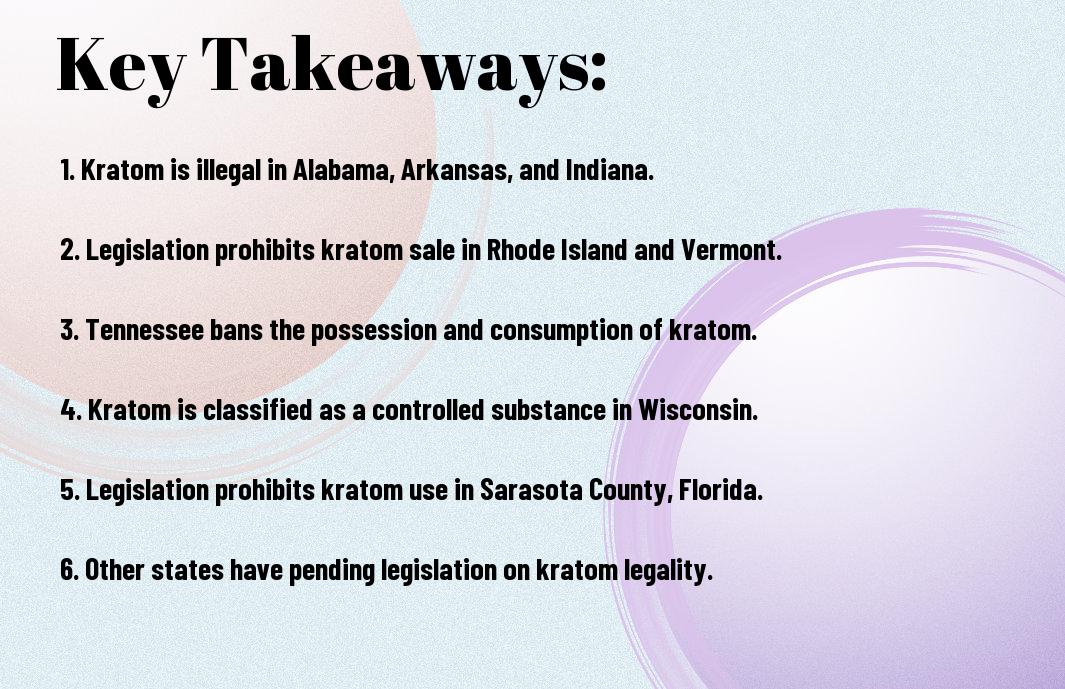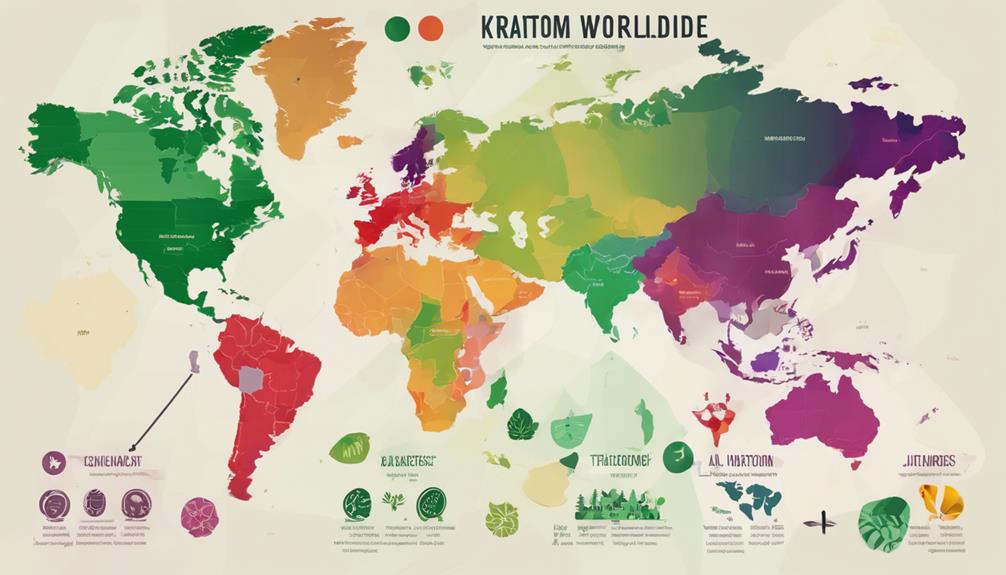With opioid addiction becoming a national crisis, many states have taken action to regulate the use of kratom, a plant native to Southeast Asia. While the legality of kratom varies across states, it is important for users to be aware of the current laws and regulations in place to avoid any legal consequences. This article will outline which states have deemed kratom illegal and the reasons behind these decisions. Stay informed to stay safe.
Key Takeaways:
- Kratom is illegal in several states: Some states have banned the sale, possession, and use of kratom due to safety concerns and potential risks.
- Regulations vary by state: It’s vital to check the legality of kratom in your state before purchasing or using it to avoid legal issues.
- Consult local laws: Stay informed about the constantly changing legality of kratom as laws and regulations may evolve over time.

Kratom Legal Status
Federal Law
One of the crucial things to understand about kratom is its legal status under federal law. Kratom is not regulated by the Federal Drug Enforcement Administration (DEA), which means it is legal to sell, buy, and possess in most states across the country. However, the FDA has issued warnings about the safety and potential risks of using kratom, so it is imperative to be informed and cautious when consuming this substance.
State-by-State Breakdown
For a more detailed understanding of kratom’s legality, it is imperative to look at the state-by-state breakdown. While kratom is legal on a federal level, some states and cities have decided to ban or regulate its sale and use. It is crucial to check the specific laws in your state to ensure that you are complying with all regulations.
State-by-State regulations can vary widely, with some states fully banning kratom, while others have specific restrictions or age requirements for its purchase. It is always best to be well-informed about the laws in your area to avoid any legal issues related to kratom.
States Where Kratom is Illegal
It is important to note that the legality of kratom varies from state to state in the United States. In some states, the use and possession of kratom are strictly prohibited. Here are some states where kratom is illegal:
Alabama
An outright ban on kratom exists in Alabama. The possession, distribution, and sale of kratom in any form are illegal in this state. Those found with kratom can face legal consequences.
Arkansas
Another state where kratom is illegal is Arkansas. The state passed a law in 2016 declaring kratom a controlled substance, making its possession and distribution illegal.
For instance, in Arkansas, the substance mitragynine and 7-hydroxymitragynine, the main active compounds in kratom, are now listed as Schedule I drugs, putting them in the same category as substances like heroin and LSD.
Indiana
On the same note, Indiana also has a ban on kratom. The state prohibits the manufacture, distribution, and possession of kratom and its derivatives.
Kratom is considered a Schedule I controlled substance in Indiana, making it illegal to possess or sell. Any violations of this law can result in criminal charges.
Rhode Island
Rhode Island is another state where kratom is illegal. The state considers kratom a controlled substance, making its possession, distribution, and use illegal.
Plus, Rhode Island includes kratom as a banned substance in its controlled substances list, making it illegal to buy, sell, or possess kratom in the state.
Vermont
Any form of kratom is illegal in Vermont. The state law prohibits the possession, sale, and use of kratom within its borders.
Another important point is that Vermont includes kratom in its list of regulated drugs, making it illegal to import, sell, possess, or use kratom for any purpose in the state.
Wisconsin
Wisconsin is yet another state where kratom is illegal. The state has labeled kratom as a Schedule I controlled substance since 2014, outlawing its possession, distribution, and use.
Wisconsin has strict laws around the use of kratom, with penalties for possession or distribution. The state classified kratom as a controlled substance due to safety concerns and the potential for abuse.
It is crucial to be aware of the legal status of kratom in your state to avoid any legal issues. The varying regulations reflect the ongoing debate surrounding the safety and efficacy of kratom, emphasizing the need for thorough research before using the substance.
States with Kratom Restrictions
Arizona
An important point to consider regarding kratom legality is that Arizona has established kratom as a controlled substance. This means that individuals in Arizona are not legally allowed to purchase or possess kratom within the state boundaries.
Florida
To understand the nuances of kratom legality in Florida, it is crucial to note that some counties within the state have implemented local ordinances regulating kratom. While kratom is technically legal at the state level, individuals should be aware of these county-specific regulations to avoid any potential legal issues.
A point to keep in mind about Florida is that although kratom is legal at the state level, some local jurisdictions have banned its sale and use. It is necessary for individuals in Florida to research and understand the specific regulations in their area to ensure compliance with the law.
Illinois
The current status of kratom legality in Illinois is that the state has made kratom a controlled substance. This classification prohibits the sale, purchase, and possession of kratom within Illinois, underscoring the strict stance the state has taken on this substance.
Restrictions on kratom in Illinois have been implemented to address concerns about its safety and potential for misuse. By classifying kratom as a controlled substance, Illinois aims to regulate its availability and ensure the well-being of its residents.
Mississippi
One crucial aspect to note about kratom in Mississippi is that the state has classified it as a controlled substance. This designation means that individuals in Mississippi are legally prohibited from purchasing or possessing kratom, reflecting the state’s strict approach to this substance.
For instance, in Mississippi, the sale and use of kratom are strictly regulated to prevent any potential harm to individuals and uphold public safety standards. Understanding the limitations set by the state can help individuals adhere to the law and avoid any legal consequences.
New Hampshire
An important consideration regarding kratom legality in New Hampshire is that the state has passed legislation to regulate this substance. While kratom is legal in New Hampshire, specific regulations and restrictions are in place to oversee its sale and use within the state.
Illinois may serve as an example for other states, as it demonstrates how implementing strict regulations on kratom can help ensure public safety and prevent potential misuse of this substance. By staying informed about kratom laws in their state, individuals can make informed decisions regarding its use and avoid any legal ramifications.

Kratom Legalization Efforts
Advocacy Groups
Efforts to legalize kratom have been ongoing, with advocacy groups at the forefront of the movement. These groups work tirelessly to educate the public and lawmakers about the potential benefits of kratom and advocate for its legal status. They highlight the medicinal properties of kratom and the importance of access for individuals who rely on it for pain management and other health issues.
Petitions and Campaigns
Legalization campaigns often involve petitions and social media campaigns to raise awareness and gather support. These efforts aim to garner public attention and pressure lawmakers to reconsider the legality of kratom. By gathering signatures and sharing personal stories, supporters hope to demonstrate the widespread support for kratom legalization and counter misconceptions about its safety and efficacy.
Legislative Updates
Groups advocating for kratom legalization closely monitor legislative developments at the state and federal levels. They work to lobby lawmakers, provide testimony, and engage in grassroots efforts to promote bills that would legalize or protect access to kratom. These updates are crucial for supporters to stay informed and actively participate in the legislative process.
The Debate Around Kratom
Despite its growing popularity, kratom remains a controversial substance with ongoing debates about its potential benefits and risks. The discussion around kratom is multi-faceted, with conflicting viewpoints that shape the narrative surrounding its legality and usage. Let’s research into the different arguments presented by both sides of the debate.
Pro-Kratom Arguments
With proponents advocating for its natural origins and potential medicinal properties, kratom supporters argue that it can serve as an alternative treatment for various health conditions. Many users praise kratom for its pain-relieving and mood-boosting effects, citing personal experiences that have improved their quality of life. Some believe that kratom can help alleviate symptoms of anxiety, depression, and chronic pain, presenting it as a safer option compared to prescription medications.
Anti-Kratom Arguments
With concerns about kratom’s addictive qualities and potential for abuse, opponents highlight the lack of regulation and standardized dosages as red flags for public health. Critics argue that kratom can lead to dependence and withdrawal symptoms, cautioning against its uncontrolled consumption. There are also worries about kratom being marketed as a natural supplement while lacking comprehensive research on its long-term effects, leading to uncertainty about its safety and efficacy.
It is important to note that the FDA and DEA have issued warnings about kratom, citing potential risks such as liver toxicity, respiratory depression, and cardiovascular complications. These alerts have fueled the anti-kratom sentiment and prompted calls for stricter regulations on its sale and distribution.
Expert Opinions
Kratom’s legality and usage have divided experts in the medical and scientific communities. Some researchers advocate for further studies to explore kratom’s potential benefits and risks, emphasizing the need for evidence-based guidelines to inform public policy. On the other hand, health professionals express concerns about kratom’s unknown long-term effects and its potential for misuse, recommending caution when considering its widespread availability.
Arguments from both sides underscore the complexity of the kratom debate, urging a balanced approach that considers the substance’s nuanced effects and societal implications.
Alternatives to Kratom
Legal Herbs and Supplements
Not all hope is lost if you are unable to access kratom due to legal restrictions. There are several legal herbs and supplements that may offer similar benefits to kratom. Some popular options include kava, kanna, and akuamma seeds. These herbs have been used traditionally for their calming and mood-enhancing effects.
Prescription Medications
For individuals who were previously using kratom to manage chronic pain or anxiety, prescription medications may be a viable alternative. Drugs like gabapentin, tramadol, or even certain antidepressants can help alleviate symptoms that were previously managed by kratom.
On the other hand, it is imperative to be cautious when transitioning from kratom to prescription medications. Always consult with a healthcare professional to ensure the safe and effective management of your condition.
Natural Remedies
Kratom users looking for natural remedies can explore options like turmeric, ginger, and valerian root. These herbs are known for their anti-inflammatory, calming, and sedative properties, which may help manage pain and anxiety effectively.
The key to success with natural remedies is consistency and proper dosing. It may take some time to find the right combination that works best for you, so be patient and observant of how your body responds to different herbal remedies.
Supplements such as magnesium, vitamin D, and omega-3 fatty acids can also support overall health and well-being, which may indirectly improve symptoms that were previously managed by kratom. These supplements are easily accessible and can be a beneficial addition to your daily routine.
Conclusion
To wrap up, kratom is illegal in several states across the United States due to concerns about its potential for abuse and lack of regulation. As more research is conducted on the effects of kratom, state legislation may continue to evolve in response to new information and public opinion. It is important for individuals to stay informed about the legal status of kratom in their state to avoid any potential legal issues.
FAQ
Q: Is kratom legal in the United States?
A: As of now, kratom is legal at the federal level in the United States. However, it is important to note that some states have banned the sale and possession of kratom.
Q: Which states have made kratom illegal?
A: Some of the states that have banned kratom include Alabama, Arkansas, Indiana, Rhode Island, Vermont, and Wisconsin. It is crucial to stay updated on the legal status of kratom in your state.
Q: Why have these states made kratom illegal?
A: States have cited various reasons for banning kratom, including concerns about its potential for abuse, dependence, and health risks. Additionally, some states have categorized kratom as a controlled substance.
Q: Can kratom users face legal consequences in states where it is banned?
A: Yes, individuals who are found in possession of kratom in states where it is illegal can face legal consequences, including fines and potentially criminal charges. It is crucial to adhere to state laws regarding kratom to avoid legal issues.
Q: Is there a possibility of kratom becoming illegal in more states in the future?
A: It is possible that more states may choose to ban kratom in the future as the debate over its safety and potential risks continues. It is imperative for kratom users to closely monitor any legislative changes regarding the legality of kratom in their state.










